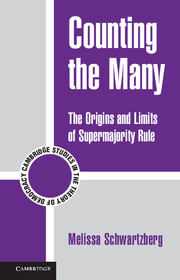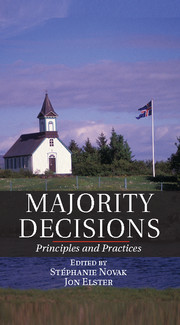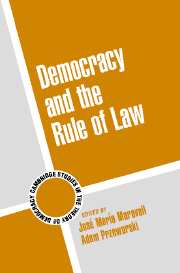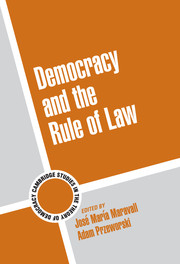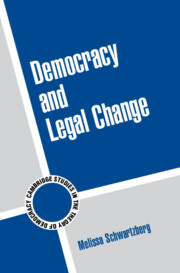Counting the Many
Supermajority rules govern many features of our lives in common: from the selection of textbooks for our children's schools to residential covenants, from the policy choices of state and federal legislatures to constitutional amendments. It is usually assumed that these rules are not only normatively unproblematic but necessary to achieve the goals of institutional stability, consensus, and minority protections. In this book, Melissa Schwartzberg challenges the logic underlying the use of supermajority rule as an alternative to majority decision making. She traces the hidden history of supermajority decision making, which originally emerged as an alternative to unanimous rule, and highlights the tensions in the contemporary use of supermajority rules as an alternative to majority rule. Although supermajority rules ostensibly aim to reduce the purported risks associated with majority decision making, they do so at the cost of introducing new liabilities associated with the biased judgments they generate and secure.
- The first sustained and systematic examination of supermajority rules
- Develops strong normative argument based on historical, empirical and formal analysis
- Situates supermajority rule within larger questions of democratic decision-making, especially the logic of counting votes and consensus mechanisms
Awards
Winner, 2016 David and Elaine Spitz Prize, International Conference for the Study of Political Thought
Reviews & endorsements
“As she did in her previous, remarkable book on entrenchment provisions, Democracy and Legal Change, Melissa Schwartzberg, in Counting the Many, shows us how little we really understand a widespread practice in modem constitutionalism, in this case supermajoritarianism. Combining sharp rational analysis and subtle historical research, Schwartzberg illuminates the origins of vote counting and the decision rules that developed along with it. Normatively, the book is courageous: Schwartzberg demonstrates in no uncertain terms that there is no justification compatible with democratic principles for supermajority requirements. Historically, the book is revelatory in several respects: for instance, Schwartzberg informs us that ‘one person, one vote’ was originally an aristocratic, not democratic, principle. Counting the Many is an excellent book that will enjoy an enormous scholarly and, hopefully, political impact.” – John P. McCormick, Professor of Political Science, University of Chicago
Product details
November 2013Paperback
9780521124492
248 pages
215 × 139 × 14 mm
0.3kg
Available
Table of Contents
- 1. Introduction
- Part I. A Remedy for the Problems of Unanimity:
- 2. Prelude: acclamation and aggregation in the ancient world
- 3. Unanimitas to a two-thirds vote: medieval origins of supermajority rule
- 4. Unanimity and supermajority rule in eighteenth-century France
- Part II. A Remedy for the Problems of Majority Rule:
- 5. Equality, majority rule, and supermajorities
- 6. Constitutionalism without supermajorities
- 7. Constitutionalism under complex majoritarianism
- 8. Conclusion.

